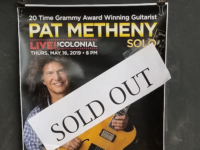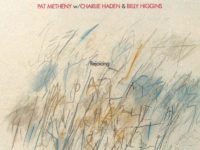I’ve been following Pat Metheny’s career since the late ’70s, but it only occurred to me very gradually what a major, important force in music he really is. Note I said “music” and not “jazz,” because his breadth and depth of the understanding of music of nearly every form, and the degree to which he can take something so inextricably complex and make it sound simple, fresh and appealing is unsurpassed by any other living being.
I might not listen to him every day, every week or even for a whole month, but every time I do, I’m pleased at what I hear casually and astonished at what I hear up close.
Pat Metheny has the wherewithal to tackle any kind of project he can think of, and gratefully to us fans of his music, he often does. He’ll team up with “out” jazz visionaries, guitar forbears, rock superstars and even Polish vocalists. He’ll make randomized noise on his own or fully composed music replete with an orchestra. With a recording career spanning decades, one wonders if there’s any major ideas Metheny hadn’t yet mined.
He answered an unequivocal “yes” in January 2010 with the issuance of Orchestrion. An orchestrion, in case you don’t know, is “a generic name for a machine that plays music and is designed to sound like an orchestra or band.” The more conventional definition, according to the Random House Dictionary, is “a mechanical musical instrument, resembling a barrel organ but more elaborate, for producing the effect of an orchestra,” but in reality such a tool doesn’t have to be confined to a single instrument.
Metheny first saw an orchestrion of the more traditional sense in the basement of his maternal grandfather’s house, and the fascination with it never left him. Later, he saw how modern technology could enable him to give instructions from his guitar to other instruments. This contraption allows him to flesh out the musical vision in his mind more accurately than than imperfect interpretations of other people. It’s as if he is overdubbing himself in real time.
When you think of it in those terms, the orchestrion seems to be less of a gimmick and more of a larger window into the big bundle of ideas that percolate inside Pat Metheny’s head. With the orchestrion doing all the heavy lifting of playing out the composed material, Metheny himself is free to improvise over it with his guitar.
The odd – or perhaps amazing is the better word – thing about Orchestrion is that despite the out-of-the-ordinary approach to making this record, it sounds very much like an ordinary Pat Metheny project. That is to say, there’s all the familiar elements that are present on a typical Metheny recording: extended and unbalanced song structures, bright harmonies, a light but steady swing, all led by Pat’s pillowy, precise guitar phrasing. It’s not quite jazz, but the fact that this whole orchestra of instruments – directed by a human, but not actually played by any humans – can swing is the most stupefying thing of all.
Orchestrion features five songs running in the 9- to 16-minute range. There are no impenetrable sonic challenges on the surface, yet they are often busy and nuanced underneath. The initial title track is as intricate as some classical pieces, with each instrument playing specific parts that make up this meticulous mosaic of sound, maneuvering through a myriad of chord changes, abrupt tempo shifts and root substitutions. Don’t ask me how, but it all comes together into a coherent, even melodious tune.
“Entry Point” is a long-developing melody that relies on careful modulation. That’s where the orchestrion is really proficient. Metheny always had an affinity for Brazilian styles and he indulges it on “Expansions,” but in his typical way, he adds layers of harmony lines to the main melody line, making it more than just a “Brazilian-flavored” tune.
“Soul Search” opens with a delicate piano passage that has an unmistakable human touch, and yet, you’d be mistaken. Later on, there’s a blues walk with a cymbal ride that only the really good drummers can pull off so squarely. Meanwhile, a bottle organ adds just a touch of little Jimmy Smith to Metheny’s Wes Montgomery before the song slinks off back into the buoyant balladry of the opening section.
“Spirit of the Air,” the closing number, applies the orchestrion to another Metheny signature, the high-register thematic line stated with his guitar and followed by other instruments in an unconventional rhythmic pattern. It’s the harmony and bass lines underneath that are simple this time, a reversal of strategy from some of the other songs performed on this album.
In the end, Orchestrion somehow still comes off like a mainline Pat Metheny record – or even a Pat Metheny Group record. So, why even bother with this contraption when he could have called the band into the studio instead? As is often the case, the devil is in the details.
Perhaps a cymbal ride here or a bass line there would have been done a little differently by a musician. Not better or worse, but it would have been that certain musician’s imprint. Orchestrion, on the other hand, is 100 percent Pat Metheny’s imprint. And I, for one, wanted to hear what a fully orchestrated album that is the complete manifestation of this musical genius’ concept sounded like. It sounds damned good.





Can't wait to enjoy Pat Metheny's performance at Seoul, South Korea in this June 2- June 5, 2010.
My friends and I really like his talent.